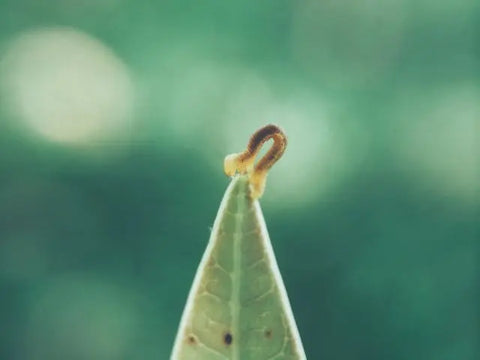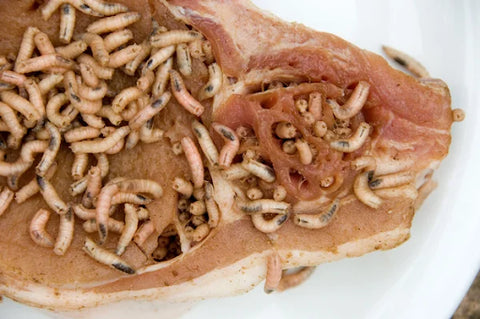
How to Get Rid of Maggots - Find Effective Ways Now
Share
Have you ever left a can of Fancy Feast out too long and found it covered in maggots? It's gross, right? Whether you recycle your empty cat food cans or not, if you're here, you probably have maggots somewhere you don't want them. We can all agree that a maggot infestation is no joke. But the good news is, in this blog post, we’re going to discuss natural ways on how to get rid of maggots quickly before you can't stand the sight of them.
What Causes Maggot Infestation At Home?
Maggot infestations are caused by poor trash disposal, too much dog waste, or the presence of a dead animal nearby. These things attract female flies, which lay their eggs there. The eggs hatch into maggots, which feed until they grow into the next life cycle stage by burying themselves in the material. Here’s the breakdown of maggot lifecycle:
- A fly lays eggs.
- After 8 to 20 hours, the eggs hatch into maggots.
- In 3 to 7 days, the maggots turn into pupae.
- Then, in 3 days to 4 weeks, the pupae become flies.
So, knowing how to get rid of maggots quickly is essential, even though they're sneaky invaders. They can lead to fly infestations and make pets sick if you have any.
How To Get Rid Of Maggots In Trash Can?

If you want to know how to get rid of maggots in garbage can, follow these steps:
- Remove the garbage bag and any trash inside the can.
- Use a hose washer to rinse the trash can's interior thoroughly. You can also use hot water, Fomin multi-surface refills, or bleach to scrub the interior.
- After cleaning, spray the inside with disinfectant to kill any remaining bacteria or larvae.
- Allow the trash can to dry completely before putting it in a new garbage bag.
- To prevent maggots from returning, securely tie garbage bags before putting them in the trash can.
How To Get Rid Of Maggots In House?
By following these steps, you can effectively eliminate maggots in your house:
- Locate the source: Try to find where the maggots are coming from. They could be in rotting food, a pet's bedding, or damp areas like drains or under appliances.
- Remove the source: Dispose of any rotting food or organic matter where maggots are present. Put it in a plastic bag before throwing it away to prevent further infestation.
- Clean the area: Thoroughly clean the area where the maggots were found using hot water, hand soap, or a mixture of bleach and water. This will help kill any remaining maggots and remove any potential food sources.
- Vacuum: If maggots are in carpets or upholstery, use a vacuum cleaner to suck them up. Empty the vacuum bag or canister immediately afterwards.
- Use a larvicide: If you're dealing with a large infestation or can't locate the source, consider using a commercial larvicide spray or powder. Follow the instructions carefully when applying it.
- Seal entry points: Prevent future infestations by sealing cracks or gaps where flies and other pests could enter your home.
- Maintain cleanliness: Regularly clean your house, especially areas prone to spills or food waste. Keep your food stored in airtight containers/boxes, and take out the trash regularly.
How To Get Rid Of Maggots On The Floor?

Looking to rid your floor of maggots without using harsh chemicals or bleach? Here are 4 natural methods to do just that:
- Salt Treatment: Maggots survive on moisture; salt is a natural dehydrator. Sprinkle a generous amount of table salt over the floor, which causes maggots to dry out. Once deceased, gather them in a plastic bag and dispose of them properly. Be sure to clean the affected area afterwards thoroughly.
- Boiling Water: Boil water into a pan and pour it over the floor where there are maggots. Repeat as necessary until all maggots are eliminated.
- Diatomaceous Earth: This natural powder is effective for eliminating maggots from floors or carpets. Sprinkle a sufficient amount over the maggots to cover them completely. The powder adheres to their bodies, dehydrating them and causing death. Dispose of the dead maggots in a plastic bag and thoroughly clean the area.
- White Vinegar: Mix three parts water with one part vinegar and pour the solution directly onto the maggots. Let it sit for about an hour before removing the maggots and cleaning the area. Maggots can’t survive in the acidic environment created by vinegar.
Final Words
Dealing with a maggot infestation is unpleasant and prevention is necessary for maintaining a clean and healthy environment. Moreover, understanding the causes of infestation and knowing how to get rid of maggots is essential to prevent infestation. While getting rid of maggots, remember quick action and regular cleaning are necessary to keep your living space maggot-free and your surroundings clean.
Building a Plastic-Free Future: Fomin's Commitment to Driving Sustainability
In an era where plastic pollution has become an alarming global issue, it is crucial to seek innovative solutions to reduce its devastating impact on our oceans and ecosystems. Annually, an astounding 8 million metric tons of plastic waste goes into our oceans, endangering marine life and the sensitive equilibrium of biodiversity on Earth. Fomin, a pioneer in sustainable initiatives, has driven the movement toward a plastic-free planet.
By purchasing Fomin's eco-friendly cleaning products, you actively participate in the battle against plastic pollution. Join our loyalty program to participate in building a sustainable future - one where plastic is not a threat but a relic of the past.
FAQ
How To Get Rid Of Maggots In Trash Can?
To prevent maggots in a trash can, ensure all food waste is securely sealed in bags before disposal. Regularly clean the trash can and its surroundings to remove any residue that could attract flies. Additionally, consider using a tightly sealed lid on the trash can to prevent flies from accessing the waste.



